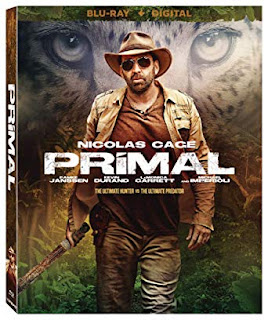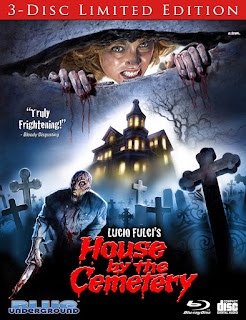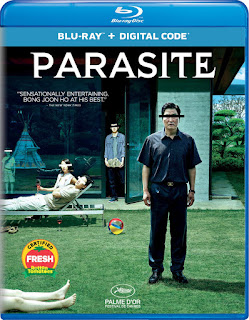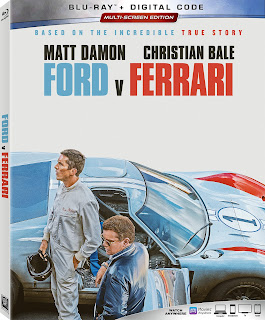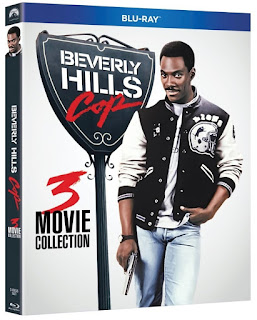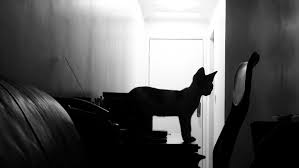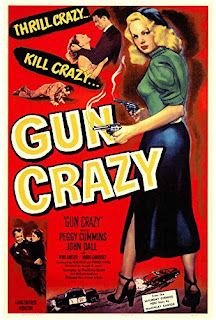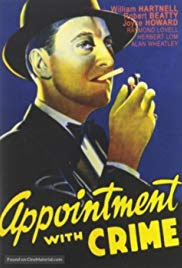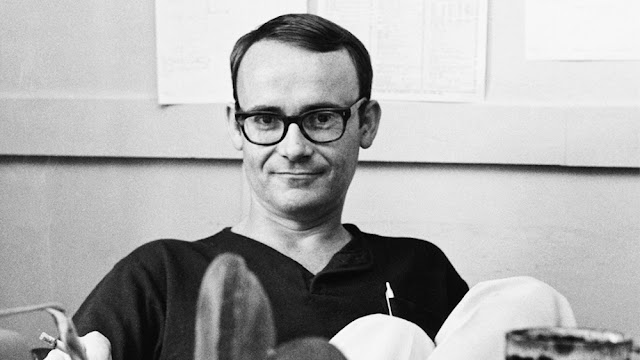LOST
NOIR: 10 Overlooked Film Noir Thrillers from the Classic Era (with one exception)
Essay
by D.M. ANDERSON💀
I'm
relatively late to the party when it comes to film noir. Sure, I've
seen the indisputable classics, but wasn't until doing Blu-ray
reviews that I've come to love this dark new world. Well, new to me
anyway.
Part
of my growing appreciation for the genre comes from the good films
that, for one reason or another, have somehow fallen into relative
obscurity compared to, say, Double Indemnity. The following
essay is a round-up of some noteworthy, lesser-known examples of film
noir released during the genre’s heyday (with one more modern
exception). So while you won’t find any Mitchums, Stanwicks or
elusive falcons, these films are worth checking out by noir fans
looking for something beyond the classics. And fortunately, all have
recently been given new life on home video, making them easy to find.
THE
MAN WHO CHEATED HIMSELF (1950)
Edward
Cullen (Lee J. Cobb) is a hardnosed San Francisco cop whose married
girlfriend, Lois (Jane Wyatt), shoots and kills her estranged
husband. Accidentally? Hmm...that's debatable, but Cullen dumps the
body near the airport, making it look like a mugging before tossing
the gun into the bay. Ironically, his younger brother Andy (John
Dall) is assigned the case. New to the force and eager to make a good
impression, Andy looks to Edward for assistance and advice. This sets
up a wonderfully complicated quandary for Edward: mentoring his
brother through the investigation of a crime he took part in.
Naturally, circumstances begin to spiral wildly out of control.
Lean,
mean and economically made, The Man Who Cheated Himself is a
solid example of classic film noir on a limited budget. The casting
is interesting, as well. Cobb displays an outward cynicism that's
perfect for the character; even as his plan begins to unravel, it's
almost as though part of him expected them to. I've always admired
John Dall's work in Rope and Gun Crazy and he's equally
interesting here, playing against-type as someone who's actually
likable and sympathetic. However, I do concur with the general
consensus that Jane Wyatt is out of her element. Fortunately, most of
the film focuses on the Cullen brothers' increasingly adversarial
relationship.
Seldom
mentioned among the great noir classics of the era, The Man Who
Cheated Himself is nevertheless a lot of seedy fun, with a
perfect final shot that speaks volumes about the genre's enduring
appeal without using a single word.
SO
DARK THE NIGHT (1946)
Though
largely unheralded, Joseph H. Lewis created some wonderful films with
limited budgets. He was a B-movie master in a variety of genres,
though film noir was where he excelled. Granted, I haven't seen many
movies on his resume, but thought 1950's Gun Crazy was a
quirky little gem. So Dark the Night, on the other hand, is a
lot more perplexing, since it certainly doesn't appear to fit the
textbook definition of film noir...at least initially.
In
fact, the tone is almost whimsical at first. When we first meet our
overly-congenial protagonist, Henri Cassin (Steven Geray), he's
strolling down a Paris street with a grin on his face, giving
friendly greetings to children and shopkeepers. Hell, I have-expected
him to break-out into song while skipping down the sidewalk.
Cassin
is France's most famous detective who decides to take a break from
police work to vacation in the country, where he meets Nanette
(Micheline Cheirel), the young daughter of an innkeeper. She's half
his age and, complicating things further, already engaged to hunky,
hot-headed young farmer Leon (Paul Marion). Everything's still bubbly
at this point, though Nanette's manipulation of both men suggests she
could turn out to be some sort of femme fatale.
When
Nanette later turns up dead, Cassin must put his renowned detective
skills to work. He initially suspects Leon, at least until his body
is discovered later. For the first time in his illustrious career,
Cassin has no leads and is completely baffled. So are we...right up
until the killer's identity is finally revealed.
So
Dark the Night doesn't play by the rules. It unfolds like a
whodunit yet offers no clues. The final revelation is nearly a red
herring, a narrative suckerpunch with no overt foreshadowing. Yet at
the same time, this is definitely what puts the film in noir
territory, because in the end, all of Cassin's questionable decisions
and subsequent problems are due to the love of a woman. Isn't that
the narrative which drives so many movies of this genre?
THE
BIG CLOCK (1948)
As
noir goes, The Big Clock isn’t a perfect fit – there’s
too much breezy humor present for that – but has enough of the same
inherent aesthetic and narrative stamps to draw favorable comparisons
to the best the genre has to offer. It also happens to be a hell of
an entertaining film.
Ray
Milland is George Stroud. As the editor-in-chief of Crimeways
magazine, he’s an expert at using clues and evidence to track-down
suspects who’ve eluded the police. The publication is run by
ruthless, time-obsessed mogul Earl Janoth (a wonderfully-repellent
Charles Laughton), who expects George to yet-again postpone an
oft-delayed honeymoon with his wife, Georgette (Maureen O’Sullivan).
When George refuses, he’s fired. Stopping at a bar before he meets
his wife for their honeymoon, he meets Pauline (Rita Sullivan),
Janoth’s former mistress who suggests a blackmail scheme as
payback. Unfortunately, George loses track of time and Georgette
leaves without him. Angry that she wouldn’t wait, George spends the
rest of the night drinking with Pauline, acquiring a sundial from a
local dive bar along the way.
He
awakens at Pauline’s apartment the next morning and makes a hasty
exit just before Janoth shows up to speak with her. During a heated
argument in the apartment, Janoth kills Pauline with the sundial.
Rather than go to the police, he turns to his lawyer, Steve (George
Macready), who suggests they re-enlist George and his staff to lead
an investigation, hoping to frame Pauline’s ‘mysterious’
visitor. It’s a brilliant set-up for an intriguing plot in which
George and his staff are investigating his own actions that night,
interviewing witnesses and following leads which threaten to expose
him. George has no choice but to play along, trying to cover his own
tracks while attempting to find the real killer himself.
The
Big Clock is everything a good thriller should be: intelligent,
suspenseful and engaging right from the opening scene. It’s often
very funny, some of the best bits coming from Elsa Lanchester as a
wonderfully eccentric artist. In fact, most of the characters are
well-rounded and perfectly cast.
GUN
CRAZY (1950)
True
to fashion, Bart
Tare (John Dall) is
a troubled sort whose life
spirals out of control due to piss-poor choices for the sake of a
woman.
He’s
been a gun lover his entire life. As much as he loves shooting them,
Bart detests the thought of actually taking a life. As a teen, his
obsession leads him to actually steal a gun, resulting in four years
at a reform school.
Following
a stint in the military, Bart returns home and reunites with
childhood friends, Dave and Clyde. He also meets his soulmate, Annie
Laurie Starr (Peggy Cummins), a sharpshooter performing with a
traveling carnival run by her sleazy & jealous boss, Packett
(Barry Kroeger). The two venture off and get married, but soon they
are broke. At Annie's urging, they embark on a cross-country
crimewave, robbing stores, banks and eventually a company's payroll,
which gets the FBI involved. Though Bart doesn't want to hurt anyone,
Annie has no qualms about killing anyone who gets in their way.
It's
a timeless story told with a lot of flare and Gun Crazy is a
superior example of modestly-budgeted film-noir. But even the most
stylish film-noir is nothing without its morally questionable
characters, and Dall is especially effective. Bart's no saint - nor
the brightest crayon in the box - but Dall instills the character
with an increasing sense of remorse over the couple's escalating
actions, making it difficult not to feel sorry for this poor rube,
doomed from the moment he lays eyes on Annie. Sure, he ultimately
brings all this misery on himself, but Dall's performance assures us
Bart was never a truly bad man...just a conflicted one.
PHANTOM
LADY (1944)
Who
says you can't find good help these days?
Unhappily
married engineer Scott Henderson has a fight with his wife and goes
to a bar to drown his sorrows, where he meets a mysterious woman. She
seems morbidly depressed, too, so he suggests they attend a show he
already has tickets for. She agrees, so long as they remain
anonymous. Afterwards, Scott goes home, only to find wife murdered -
strangled by one of his own neckties - and he's the police’s number
one suspect.
Since
Scott’s only alibi is a woman whose name he doesn't know, Inspector
Burgess (Thomas Gomez) has a hard time believing his story,
especially since potential witnesses claim they never saw Scott with
a woman that night. But his dedicated secretary, Carol (Ella Raines),
is convinced of his innocence. With 18 days left until he's executed,
she goes out on her own to find this mysterious woman and clear his
name.
If
you ask me, that level of dedication makes Carol a shoo-in for
Employee of the Month. Well, she is secretly in love with
Scott, which I suppose is good motivation. She eventually gets help
from Burgess and, almost too conveniently, Jack Marlow (Franchot
Tone), a friend of Scott's who later flies into town upon hearing
about his conviction.
A
minor and obscure entry in the film noir genre, this crime caper
moves along at a brisk enough pace that we don't question most of the
story implausibilities until it's over. Despite the billing order,
Raines is the real star of the film and she's quite engaging. So
while we ain't talking Hitchcock or Huston here, Phantom Lady is no classic, nor does anything about it doesn't resonate much
afterwards, but certainly entertaining in the moment.
TRAPPED
(1949)
While
hardly the most stylish thriller ever made, Trapped
has some
nifty surprises along the way.
Many
of those surprises are found in the plot itself, particularly during
the first half. Incarcerated counterfeiter Tris Stewart (Lloyd
Bridges) is offered a reduced sentence if he helps the Treasury
Department track down the same engraving plates he once used to print
fake bills. Agents plot a staged escape, but Stewart double-crosses
them, which they actually expected to happen, having already bugged
girlfriend Meg’s (Barbara Dixon) apartment and planted uncover
agent John Downey (John Hoyt) as a low-level gangster in anticipation
of Tris returning to his old ways. But the plot twists don’t end
there.
For
me, the biggest surprise was in the casting. Predating his days as an
underwater man-of-action or glue-sniffing buffoon, Bridges is tough,
cold-blooded and menacing as Stewart. Conversely, Hoyt – mostly
known playing arrogant bad guys – makes a formidable adversary,
ultimately becoming the story’s main protagonist. Their roles could
have been reversed and the film would have been fine, but watching
them play against type adds an extra layer of fun.
Economically
directed by Richard Fleischer, Trapped is entertaining and
unpredictable, with interesting characters bolstered by solid
performances. For film noir lovers, Trapped is worth
rediscovering.
THE
SET-UP (1949)
Film
noir and boxing go together like cops & doughnuts, and for my
money, there isn’t a more effective example than The Set-Up.
More so than The Killers or The Harder They Fall, we
really feel like we’re examining the underside of a rock.
Robert
Ryan is terrific as “Stoker” Thompson, an aging boxer who never
hit the big time. Still, he clings to the hope that he’ll win again
someday. And he’s just one of a dozen-or-so others who fight each
weekend at the seedy Paradise City Arena. Some are young hopefuls,
others are as worn-out and weary as Stoker. Though it’s never
spoken, most of these men seem aware they’re destined to serve as
cannon fodder for up-and-coming boxers bankrolled by crooked
gamblers.
Thompson’s
manager, Tiny (George Tobias) arranges for him to take a dive during
his next match, but since Stoker has lost his last 27 fights,
neglects to inform him. Meanwhile, Stoker gears-up for the match,
confident he can win this time. However, his wife, Julie (Audrey
Totter), refuses to watch him take another beating. In fact, she
wants him to quit so the two of them can start a new life.
Primarily
a character study, The Set-Up is presented almost in real
time, from the deal Tiny makes with local mobster Little Boy (Alan
Baxter), through the revealing, introspective locker room moments and
culminating in Stoker’s match. By this time, his quiet desperation
not-only has us rooting for him, but fearing for his life since he’s
completely unaware he’s supposed to lose.
Director
Robert Wise has made a slew
of
iconic classics in a variety of genres, which tends to overshadow how
skillfully he could put together a comparatively small, visceral
piece of film noir, particularly in his early years. The
Set-Up is
a prime example of the genre, full of intriguing character-driven
moments, a bruising climax and a bittersweet resolution.
APPOINTMENT
WITH CRIME (1956)
Leo
Martin (William Hartnell) is a
smash & grabber, hired by local boss Gus Loman (Raymond Lovell)
to hit a downtown jewelry store. During the job, however, Leo’s
wrists are broken and Loman leaves him behind to be apprehended by
the police. After doing his time, Leo is released and plots revenge
by framing Loman for a murder. But Loman answers to an even bigger
crime boss, Gregory Lang (Herbert Lom), the actual owner of the gun
Leo used. Meanwhile, Leo hooks up with local dancer Carol Dane (Joyce
Howard) in order to provide an alibi and throw local police off his
trail.
This
is typical film-noir fodder with the usual tough-guys, femme fatales
and overwrought performances, Hartnell’s in particular. Although
Appointment with Crime offers nothing new (Leo still refers to
the police as coppers), the story is told with enough panache
to maintain interest. Old school Doctor Who fans will enjoy
seeing Hartnell unleash his inner Cagney and it’s always a pleasure
to check out the late, great Herbert Lom before he gained worldwide
notoriety as Inspector Clouseau’s oft-suffering police
commissioner.
WHILE THE CITY SLEEPS (1956)
There's
a serial thrill-killer (John Drew Barrymore) who preys on young women
in their apartments. At the scene of his latest kill, he scrawls a
cryptic message, "Ask mother," on the wall with lipstick,
prompting the press to dub him the Lipstick Killer.
Meanwhile,
Kyne Inc., one of the city's media empires, is thrown into turmoil
after its owner suddenly dies. Kyne's son and heir, Walter (Vincent
Price), is an arrogant douchebag who uses the Lipstick Killer story
to manipulate three of his greedy underlings into competing for
second in command. One newsman who wants no part of this is Edward
Mobley (Dana Andrews), who’s more concerned with catching the
killer than getting a promotion and keeps abreast of the
investigation through a friend on the force, Lt. Kaufman (Howard
Duff).
Not
much sleeping gets done in this city (though there's some sleeping
around) as everyone undermines each other's attempts to be promoted,
to the point where the film sometimes plays more like a soap opera
than hardcore film noir. Still, the story and subplots are just
interesting enough to keep our attention until this perpetually
perspiring perve strikes again. Andrews' no-frills acting style
serves his character well, while Rhonda Fleming & Ida Lupino make
terrific temptresses who are as conniving as they are easy on the
eyes.
A
relatively minor late-career directorial effort from the great Fritz
Lang, While the City Sleeps is nevertheless an engaging
potboiler. Though not particularly memorable, it's efficiently-made,
fast-paced and sometimes quite humorous.
NIGHT
MOVES (1975)
Night
Moves isn't from film noir's Golden Age, but like the rest on this list, it never really found an audience during its initial release. Is it a lost classic?
Not quite, but it does showcase another great performance by Gene
Hackman.
Despite
a murder mystery thrown into the mix relatively late in the story,
this is mostly about Harry Moseby (Hackman), an ex-football player,
now a private detective who's been hired by a has-been starlet to
locate her wayward, free-spirited daughter, Delly (Melanie Griffith,
in her debut). Harry meets a variety of eccentric folks along the
way, some who are in the movie business, others eking out a living on
the Florida coast. But all of them have some sort of connection to
Delly. Harry's also trying to come to terms with his cheating wife
(Susan Clark) and her lover (Harris Yulin), which forces him to
re-examine his own life.
It's
a leisurely-but-enjoyable ride peppered with interesting characters,
including a quirky early performance by James Woods (he hasn't
changed much since). The movie belongs to Hackman, though. I don't
know if the role was created for him, but he embodies Harry's
world-weary cynicism perfectly.
Night
Moves has grown in stature over the years, though it's hardly a
cinema milestone compared to Hackman & Penn's previous
collaboration, Bonnie and Clyde. Still, Hackman is
compulsively watchable, as usual, and as a solid mid-70s' spin on
classic noir, it's an interesting curiosity worth rediscovery.



